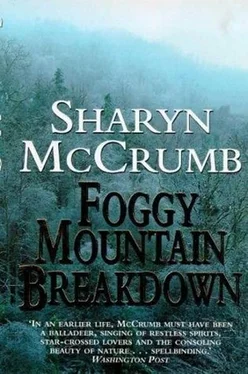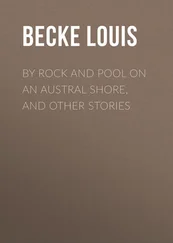Sharyn McCrumb - Foggy Mountain Breakdown and Other Stories
Здесь есть возможность читать онлайн «Sharyn McCrumb - Foggy Mountain Breakdown and Other Stories» весь текст электронной книги совершенно бесплатно (целиком полную версию без сокращений). В некоторых случаях можно слушать аудио, скачать через торрент в формате fb2 и присутствует краткое содержание. Жанр: Детектив, на английском языке. Описание произведения, (предисловие) а так же отзывы посетителей доступны на портале библиотеки ЛибКат.
- Название:Foggy Mountain Breakdown and Other Stories
- Автор:
- Жанр:
- Год:неизвестен
- ISBN:нет данных
- Рейтинг книги:3 / 5. Голосов: 1
-
Избранное:Добавить в избранное
- Отзывы:
-
Ваша оценка:
- 60
- 1
- 2
- 3
- 4
- 5
Foggy Mountain Breakdown and Other Stories: краткое содержание, описание и аннотация
Предлагаем к чтению аннотацию, описание, краткое содержание или предисловие (зависит от того, что написал сам автор книги «Foggy Mountain Breakdown and Other Stories»). Если вы не нашли необходимую информацию о книге — напишите в комментариях, мы постараемся отыскать её.
Foggy Mountain Breakdown and Other Stories — читать онлайн бесплатно полную книгу (весь текст) целиком
Ниже представлен текст книги, разбитый по страницам. Система сохранения места последней прочитанной страницы, позволяет с удобством читать онлайн бесплатно книгу «Foggy Mountain Breakdown and Other Stories», без необходимости каждый раз заново искать на чём Вы остановились. Поставьте закладку, и сможете в любой момент перейти на страницу, на которой закончили чтение.
Интервал:
Закладка:
They all shook their heads. “Sorry we can’t help, little lady,” drawled Scarberry.
“Wait!” said Connie Samari. “We never decided what to do with Hawkins’s hour!”
“Ah! Hawkins’s hour,” said Rose Hanelon with a feral smile. “I will be taking that.”
By skipping breakfast, Rose managed to get three hours of sleep before the conference sessions began, but she still looked like a catatonic bag lady. Five cups of coffee later, she had recovered the use of most of her brain cells, but she was still considerably lacking in presentability. When she ran into Joe Villanova, helping himself to doughnuts at the coffee break in the hall, he did a double take and said, “If you’ll lie down, I’ll draw chalk marks around you and ask the coroner to take a look at you.”
His next-door neighbor managed a feeble snarl. “Buzz off, Villanova. I’m solving this case for you. Come to the next lecture in the Catawba Room, and you’ll see.”
“You don’t mind if we continue doing the fingerprinting and the suspect interrogations in the meantime, do you?”
“Not at all. So glad you could finally manage to come.”
“Hey, I’m not risking my neck in a helicopter for a guy who is already dead. Listen, when you do this lecture of yours, don’t violate anybody’s rights, okay? I have to get a conviction.”
Rose looked up as a gaggle of silver-haired women walked by. They were wearing Poet name tags and they seemed to be earnestly discussing onomatopoeia. “I don’t suppose you could arrest all of them, Joe,” she said. “We have quite a surplus of poets.”
The Catawba Room was packed. Some of those present were groupies of the distinguished and handsome poet, and they had not been informed of his death. Others had heard that a mystery writer was going to conduct the session, and attended in hopes of hearing a post mortem. All the poets were there in force in case Rose Hanelon didn’t use the whole hour. Scarberry, whose session had consisted of three elderly ladies, adjourned his group and joined the crowd in the Catawba Room. Villanova, with a ridiculous smirk on his face, sprawled in the front row with his arms folded, waiting for Rose to make an idiot of herself.
Rose surveyed the sheeplike faces and wished she’d had time for another cup of coffee. “Good morning,” she began. “I have come to bury John Clay Hawkins, not to praise him. As you know, our featured speaker was murdered last night with an empty bottle of Jack Daniel’s.”
“Those who live by the sword…” muttered Samari from the front row.
“Even now the police are measuring and photographing, and doing all that they can to collect the physical evidence to convict the killer. I used another approach-the examination of motives. Who would want to kill a poet?”
A suppressed whoop of laughter emanated from the romance writers’ contingent in the back of the room.
“Precisely,” said Rose. “Who wouldn’t want to kill a poet? But why this particular poet, when there are so many more annoying and less-talented specimens around. Besides, in this case, the suspects were all poets themselves, or people well acquainted with John Clay Hawkins as a human being.”
Hawkins’s fellow bards glared up at her from their front-row seats.
“The main motive that occurred to me was professional competitiveness. Hawkins, as a well-known minor poet, had a number of workshop engagements, editorships, and other poetic plums that everyone else seemed to want very badly.” Rose nodded in the direction of Jess Scarberry’s waving hand, acknowledging his objection. “Yes. Except for Jess Scarberry. No one would give him any literary recognition, not even if he was the last poet on earth. But I doubt if he minds. He’s in the game to pick up women and sell chapbooks, and he can do all of that without any academic recognition. If he killed Mr. Hawkins, it would have to be for more personal reasons. I didn’t find any.”
“That left Samari, Snowfield, and Carter Jute, whose personal attributes suggest that poems are made by barracudas. I didn’t even have a favorite suspect among them. So I read Amy Dillow’s thesis about John Clay Hawkins. And I read the last poem of Hawkins himself. Bear with me.”
She read the poem in clear measured tones to the startled audience. “At least it’s timely,” she remarked. “I wondered why Hawkins was thinking of Norman, and if in fact he knew anyone by that name.” Rose held up Amy Dillow’s thesis. “It turns out that he did. His old college roommate Norman Grant, interviewed by Ms. Dillow here as a source for material about Hawkins’s early years. I called Norman Grant, and read him the poem.”
“Since you had no address, how’d you find him on a Saturday morning?” Villanova called out from the front row. He was obviously enjoying himself.
Rose smiled. “Professional connections. The PR director of his alma mater is a colleague of mine. She looked him up in the alumni directory. Anyway, I called Norman Grant, and read the poem to him.”
There was a murmur of interest from the audience.
Rose shrugged. “He said it made no sense to him, either. But then he said Hawkins’s poems never did make sense, as far as he could tell. People just read them and assigned them meanings. He said John Clay used to joke that once a critic found one of your works profound, then anything else you ever wrote would be analyzed to death. Didn’t matter what it was. He said John Clay was getting pretty tired of all the pretension, and of the old-boy network of you-blurb-my-chapbook-and-I’ll-publish-your-poem-in-my-literary-magazine. He said it was the Mafia with meter. He said that Hawkins was talking about quitting the poetry business and coming to work with him. Mr. Grant is a crop duster in north Georgia.”
“He’s lying!” Amy Dillow called out. “He was always jealous of Hawkins’s success. Norman Grant flunked English!”
“He told me that, too,” said Rose. “He said they used to laugh about it, because John Clay Hawkins wrote his papers for him that term. Now assuming Hawkins was planning to quit poetry, there would be no need for the other poets to do him in, but that still leaves one very clear motive.” She pointed to Amy Dillow. “If Hawkins renounced poetry, your graduate career would have been ruined, wouldn’t it? You couldn’t very well make your literary reputation on an ex-poet who was never widely recognized to begin with. Besides, dead poets are so much more respected than live ones. Look at Sylvia Plath: famous for being dead.”
Amy Dillow jumped to her feet. “He had no ambition!” she cried. “He wouldn’t apply for the right fellowships, or curry favor with the really important critics. I had to do something! His work really had potential, but he was holding back his own reputation. I did it for scholarly reasons! I had to kill him so that I could devote myself to the legend!”
Rose’s jaw dropped. “You did?” she exclaimed. “You mean you did it?”
Amy Dillow nodded. “I thought you had figured it out.”
“No,” Rose blurted before she thought better of it. (It had been a long night.) “I was just using that theory for dramatic effect, building up for the big finish. You see, Norman Grant also told me that Hawkins’s first wife, Dreama Belcher, is still a librarian, but now she writes romance novels as Deidre Bellaire. I assumed she had done it.”
A wizened figure in rhinestones and green chiffon stood up in the back of the room, waving her fan. “I killed the bastard off in eight Harlequins and three Silhouettes,” she called out. “That was enough. Got it out of my system.”
Joe Villanova’s shouts of laughter drowned out the polite applause from the mystery fans. Rose Hanelon shrugged. “My editor will want me to change this ending.”
Читать дальшеИнтервал:
Закладка:
Похожие книги на «Foggy Mountain Breakdown and Other Stories»
Представляем Вашему вниманию похожие книги на «Foggy Mountain Breakdown and Other Stories» списком для выбора. Мы отобрали схожую по названию и смыслу литературу в надежде предоставить читателям больше вариантов отыскать новые, интересные, ещё непрочитанные произведения.
Обсуждение, отзывы о книге «Foggy Mountain Breakdown and Other Stories» и просто собственные мнения читателей. Оставьте ваши комментарии, напишите, что Вы думаете о произведении, его смысле или главных героях. Укажите что конкретно понравилось, а что нет, и почему Вы так считаете.












